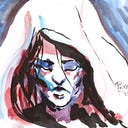Member-only story
More Pulp Fiction Than Research

ADAM LASHINSKY — WILD RIDE — INSIDE UBER, QUEST FOR WORLD DOMINATION — 2017
The book, at Uber’s temporal scale of things, is already old. It wa published five years ago, before COVID-19, and written over a quite longer period of time. The book has a tremendous defect: it is journalistic and as such there are repeats, and the objective is not to analyze a situation, here a corporate project, and to find the logic of it. It is, all the more difficult because Travis Kalanick does not use standard words in their standard meaning, so that a sentence may mean nothing. In other words, you need a Kalanick-English dictionary constantly. And what’s more, he also considers the only way to speak is metaphorically, and not only that, but also symbolically, parabolically, imaginatively, and so many other distantiation from normal language. This language is never seriously analyzed and even considered. On page 204, the author enumerates Kalanick’s “‘brand pillars’ — grounded, populist, inspiring, highly evolved, and elevated.”

The author starts examining “grounded”: “By ‘grounded’ he [Kalanick] generally means practical: it uses technology to move people from one place to another. Yet […] ‘Grounded is like tonality,’ says Kalanick. ‘it’s like functional straight lines, the whole thing. All of the conference rooms are named for cities. They’re in alphabetical order. Like it’s just very practical.’” I have removed the recollection of the child Kalanick seen as a science-fiction reader, especially since we do, not know which science-fiction it is, Ron L. Hubbard science-fiction has little to do with Asimov, or Frank Herbert, with Dune or Blade Runner. But it has absolutely nothing to do with anything outside the American, meaning the US side of things. In science fiction, he would be well inspired to get to Chinese science fiction like the recent Chen Qiufan (The Waste Tide) or the rather old Lao She (Cat Country or City of Cats). He might understand the doom that is always imploding from inside when we reduce the world to me and the rest, to zero and one, to good or bad, to black or white, or Kalanick’s best “bits and atoms” (page 128), or even…
